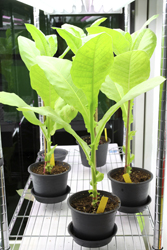Plant-based protein-production systems
The 'Contained molecular farming - Controllable contained systems for high yield and consistency' (COMOFARM)(opens in new window) project compared various plant species and four plant-based systems: hydroponic plants, root cultures, cultivated moss and suspension of plant cells. Their products of interest were the human antibody M12 and variants of the influenza virus hemagglutinin — secreted and membrane-integrated forms. Comparative analysis of matrix platforms and characterisation of plant species revealed that tobacco leaves and BY-2 cells are suitable platforms for recombinant protein production. Extensive testing was successfully done to optimise nutritional and physical parameters as well as molecular factors to consistently increase product yield and quality. COMOFARM developed a novel technique to produce monoclonal BY-2 cell-suspension lines using fluorescence-activated cell sorting for selecting clones. Stacking parameters were optimised for M12 antibody production in BY-2 cells. Interestingly, high-osmolarity media were more essential to increasing the rhizosecretion of antibody M12 rather than the nutrient content. Other important factors included homogeneity of cell and tissue cultures and the selection of elite producers during plant breeding. Several automated plant monitoring and maintenance systems such as the DsRed fluorescence imaging, respiration activity monitoring system (RAMOS) and the Growscreen-Fluoro system were assessed. The RAMOS device was successfully optimised for monitoring BY-2 cell suspensions and moss cultures, and integrated into prototype bioreactors. After optimising quality and yield, COMOFARM worked on standardising procedures for good manufacturing practice compliance and eventual commercialisation. Pilot-scale upstream M12 manufacture from BY-2 cell suspension cultures in the 200-L OrbShaker device showed good yield with a 666-fold scale-up. Scientists finalised downstream M12 extraction and purification strategies from tobacco plants and BY-2 cells using a four-step and three-step process, respectively. The bulk M12 antibody produced from the 200-kg–scale process demonstrated good M12 integrity, purity and sterility. Project activities were disseminated via the project website, publications, presentations, posters and conferences. Successful commercialisation of these working prototypes could pave the way for cost-effective automated plant-based production of proteins. This has important implications for the health and industrial sector as well as the EU economy.







